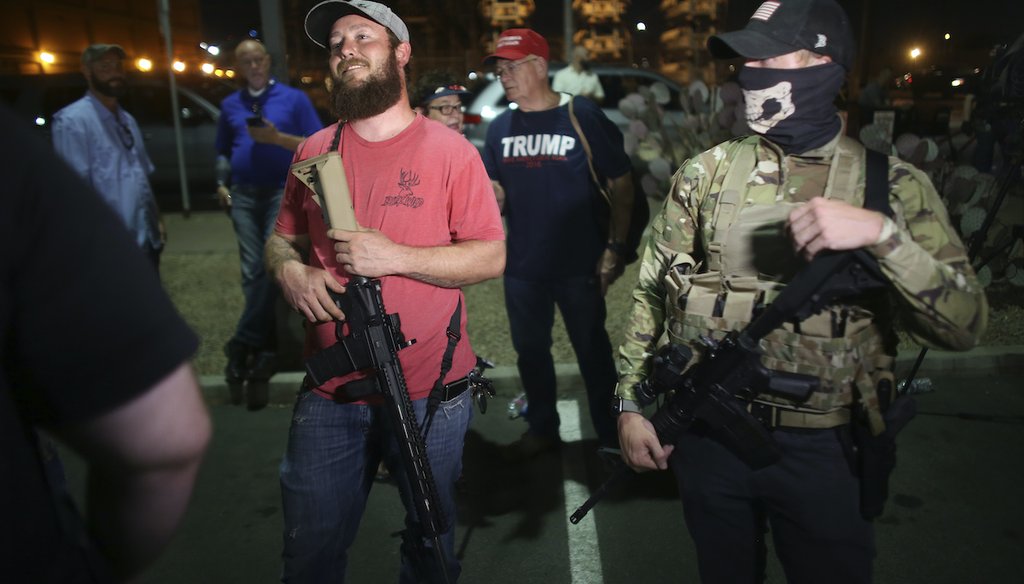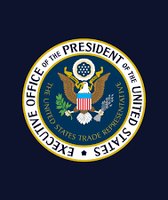Stand up for the facts!
Our only agenda is to publish the truth so you can be an informed participant in democracy.
We need your help.
I would like to contribute

Armed supporters of then-President Donald Trump stand outside of the Maricopa County Recorder's Office, where general election votes were being counted, Nov. 5, 2020 in Phoenix. (AP)
If Your Time is short
-
State legislators are proposing bans on guns at the polls after seeing armed protests at vote counting sites and threats of violence against election workers.
-
Only a handful of states specifically prohibit openly carried and concealed guns at the polls.
-
States generally ban guns at locations such as K-12 schools, which may also serve as polling sites.
As voters walked up to a ballot drop box outside the Arapahoe County administration building in Colorado on Nov. 2, 2020, the day before Election Day, they saw two men – one wearing a holstered handgun – filming voters as they dropped off their ballots.
Some voters told county officials they felt threatened. Law enforcement concluded that the men were not interfering with voting and didn’t break the law. The men were activists who routinely film interactions with public officials, as they did near the ballot drop box.
Election officials and voting rights advocates in Colorado have used the incident to advocate for passage of the Vote Without Fear Act, a bill that bans open carry within 100 feet of a ballot drop box, polling site or vote counting facility. (It doesn’t however ban the filming of voters.) Gov. Jared Polis signed the measure in March.
Josh Zygielbaum, county clerk in Adams County, Colorado, said the bill sends a message that a voting site "should be a safe place and people should be free to exercise their First Amendment and vote for who they want to vote for without fear and intimidation." There are some days when Zygielbaum, a Marine veteran, wears a bulletproof vest to work due to threats faced by election officials in 2020.
Colorado joins a minority of states that explicitly ban guns at the polls – and among an even smaller group that bans firearms at vote counting centers.
Sign up for PolitiFact texts
Six states in 2020 prohibited both openly carried and concealed guns at the polls: Arizona, California, Florida, Georgia, Louisiana and Texas, according to the Giffords Law Center to Prevent Gun Violence. In 2021, Virginia became the seventh state. Four states prohibit only concealed carry at polls: Mississippi, Missouri, Nebraska and South Carolina, according to Giffords. In March, Washington Gov. Jay Inslee signed a bill to ban openly carried guns at election facilities.
The violent attack on Jan. 6, 2021, at the U.S. Capitol, on the day that Congress certified the presidential election vote, was the most visible example of individuals brandishing weapons in an effort to interfere with democracy. But in 2020, armed protesters also showed up at vote counting centers in Phoenix, Las Vegas and Philadelphia.
Voting rights experts say that polls and other election-related sites are among facilities that should ban guns in order to prevent election-related violence.
Assuring voters that voting sites are peaceful
Polling places are heavily regulated to preserve what the Supreme Court has called an "island of calm" for voters, wrote two law professors in a 2020 essay for Slate. All states prohibit "electioneering" at polling sites which means displaying signs or wearing campaign clothing in or near voting sites, wrote Joseph Blocher, a Duke university law professor, and Alan Chen, a university of Denver law professor.
But laws that expressly ban guns at voting sites are far less common.
"The result is that a voter might be legally prohibited from wearing a button bearing an NRA slogan but permitted to carry an actual gun. Neither the Constitution, nor history, nor policy considerations require this paradoxical state of affairs," they wrote.
Some states have long banned guns at voting sites, including Georgia, where the state Supreme Court wrote in 1874: "The practice of carrying arms at courts, elections and places of worship, etc., is a thing so improper in itself, so shocking to all sense of propriety, so wholly useless and full of evil, that it would be strange if the framers of the constitution have used words broad enough to give it a constitutional guarantee."
In the states with explicit gun bans, the details vary. Georgia bans carrying firearms within 150 feet of any polling place, while Missouri bans guns within 25 feet of a polling place. Arizona’s law bans entering a polling place on Election Day carrying a deadly weapon. Virginia extends the ban to places where electoral boards meet or recounts take place.
"There's a certain peace of mind for a voter knowing that there are no guns in the polling places," said Virginia Del. Mark Levine, D-Alexandria, a sponsor of the ban, in 2021. "Whether they can see the guns or they can't see the guns, they know that it's prohibited."
Documented incidents of people showing up at voting sites in recent years carrying guns or making violent threats are sporadic and varied. In October 2020 in Charlotte, North Carolina, a voter showed up with what police said was a legally-carried holstered gun at a voting precinct. He was asked to leave. He later returned, set up a folding chair and told a precinct judge he was there to catch some sun. He was arrested for trespassing.
While actual incidents of armed individuals showing up at voting sites are rare, threats are more common: the Justice Department said in January that it is investigating more than 850 threats against election workers.
Zygielbaum, the county clerk in Adams County, Colorado, said that his office received threats in 2020, including a person "who said that they will see us on the battlefield and they will walk away alive."
Groups that have advocated for states to ban guns at election sites include the American Bar Association; Brady, an organization that supports gun control laws; and The Educational Fund to Stop Gun Violence. They argue that explicit bans on guns at the polls provide more clear guidance than broader laws that say guns can’t be used to intimidate others.
"The presence of firearms at polling places, regardless of whether they are meant to intimidate, may discourage people from voting," wrote the Educational Fund to Stop Gun Violence. "A clear prohibition on firearm possession in places of political participation would send a plain message to voters that they can participate in democracy without fearing for their safety and will make enforcing these laws easier for law enforcement and the courts."
Their efforts have been opposed by some, but not all, gun rights supporters. Colorado State Sen. Paul Lundeen, a Republican and minority whip, said during a hearing that the bill is a red herring for gun control. "The real underlying issue here is nibbling away at a constitutionally guaranteed right – the right to keep and bear arms," he said.
Not so, said Michigan Rep. Stephanie Young, a Democrat who introduced a bill to ban guns within 100 feet of the entrance of a polling site on Election Day.
"Let’s be clear: this is not about our constitutional right to own guns," Young said in March. "We already have laws in place that limit where people are allowed to carry firearms — places like churches and daycare facilities and sports arenas — so there’s nothing crazy or malicious about this legislation."
Whether more bans pass or not, election workers are routinely meeting with law enforcement officials to discuss plans for security and safety surrounding elections. While law enforcement is not visible at every polling site, they are often stationed nearby if needed during election time.
Amid violent threats at various types of places, election workers need to take steps to deliver secure and accessible elections both for voters and workers, said Paul López, the election clerk in Denver.
"We have to take every measure necessary to protect people who are running the elections: our fellow citizens, family and friends," Lopez said.
RELATED: Jan. 6 defendants were armed with guns, other weapons, documents show
RELATED: What can the federal government do right now to protect voting rights before the 2022 midterms?
Our Sources
Giffords Law Center to Prevent Gun Violence, Preventing Armed Voter Intimidation, September 25, 2020
The Educational Fund to Stop Gun Violence, Defending Democracy: Addressing the Dangers of Armed Insurrection, January 2022
American Bar Association, Opposition to Guns in Polling Places, July 23, 2021
Supreme Court of Georgia, Hill v. State, 53 Ga. 472
NBC, 'I will bring every single gun loaded,' parent tells Virginia school officials during mask mandate meeting, Jan. 21, 2022
Detroit Free Press, Judge: No ban on open carry at polls; He strikes down Benson's gun directive for Election Day, Oct. 28, 2020
The Fulcrum, Packing at the polls: Fine most places, so another voting security worry, Oct. 27, 2020
Colorado General Assembly, The Vote Without Fear Act, 2022
Georgia law, 21-2-413 - Conduct of voters, campaigners, and others at polling places generally
Missouri law, 571.107
Arizona, 13-3102
Washington state, House Bill 1630, 2022
Michigan, House Bill NO. 5947, 2022
Colorado Public Radio, Dueling bills show the partisan divide over how Colorado should run its elections, Feb. 28, 2022
Virginia Public Radio, Advocates Seek to Ban Guns at Virginia Polling Locations, Jan. 20, 2021
The Gazette, Colorado lawmakers advance election bills, reject measure eliminating vote by mail, March 16, 2022
Amagansett Press, Youtube video, Nov. 2, 2020
AP, Increasingly normal: Guns seen outside vote-counting centers, Nov. 7, 2020
Pittsburgh Tribune Review, Threat case set for trial, Nov. 20, 2018
Charlotte Observer, Charlotte police plan polling site 'zone checks' after black volunteer threatened, Oct. 25, 2018
Charlotte Observer, Armed Trump supporter arrested at NC voting site faces new charges, police say, Nov. 4, 2020
Englewood Herald, Men filming voters in Littleton were 'first amendment auditors,' police say, Nov. 3, 2020
Georgetown Institute for Constitutional Advocacy and Protection, State fact sheets, 2020
NBC, U.S. police chiefs grapple with new Election Day threat: Armed men at the polls, Oct. 18, 2020
Pew Research Center, What the data says about gun deaths in the U.S. Feb. 3, 2022
Slate, Why Do States Ban "Electioneering" but Allow Guns at Polling Places? Jan. 5, 2021
WNDU, Michigan bans open carry of guns inside state Capitol, Jan. 11, 2021
Virginia Department of Elections, 2021 Changes to Virginia’s Election Laws
Brennan Center, Voters Should Not Be Intimidated, Oct. 7, 2020
U.S. Department of Justice, Readout of Justice Department Leadership Meeting with Election Officials, Jan. 26, 2022
Michigan Advance, As political threats intensify, Michigan Dems look to ban guns at polling places, March 17, 2022
The 19th, As election workers face increased threats and intimidation, some states are trying to protect them, March 30, 2022
Colorado Channel, Colorado Senate 2022 Legislative Day 069, March 21, 2022
Charlotte Observer, Armed Trump supporter arrested at NC voting site faces new charges, police say, Nov. 4, 2020
Telephone interview, Michigan state Rep. Stephanie Young, March 17, 2022
Telephone interview Josh Zygielbaum, county clerk in Adams County, Colorado, 2022
Telephone interview, Kelly Roskam and Tim Carey at the Educational Fund to Stop Gun Violence, March 22, 2022
Telephone interview, Daryl Johnson, DT Analytics, March 23, 2022
Telephone interview, Paul Lopez, Denver clerk, March 23, 2022
Email interview, Conor Cahill, Gov. Jared Polis spokesperson, March 26, 2022
Telephone interview, Luc Hatlestad, spokesperson for Arapahoe County, Colorado, March 23, 2022
Email interview, Allison Anderman, Senior Counsel and Director of Local Policy, Giffords Law Center to Prevent Gun Violence, March 24, 2022








































